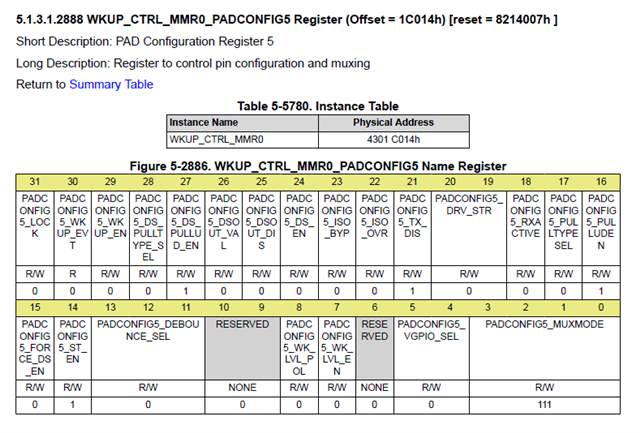Other Parts Discussed in Thread: TDA4VL,
Hi team,
Part number = TDA4VL
Linux = PROCESSOR-SDK-LINUX-J721S2 08_00_04_05
RTOS = PROCESSOR-SDK-RTOS-J721S2 08_00_04_04
The customer is running the Linux operating system on the A72. He wants to implement GPIO external interrupt function on Linux operating system. GPIO pins = GPIO0_5 (AD25)
For GPIO interrupts, he finds that request_irq returned successfully. He tries to trigger an interrupt (make sure the level of GPIO0_5 (AD25) is flipped), but the interrupt service function never responds. Below is the code:
diff --git a/board-support/linux-5.10.100+gitAUTOINC+7a7a3af903-g7a7a3af903/arch/arm64/boot/dts/ti/k3-j721s2-common-proc-board.dts b/board-support/linux-5.10.100+gitAUTOINC+7a7a3af903-g7a7a3af903/arch/arm64/boot/dts/ti/k3-j721s2-common-proc-board.dts
index 35edbc1..9c75e3f 100755
--- a/board-support/linux-5.10.100+gitAUTOINC+7a7a3af903-g7a7a3af903/arch/arm64/boot/dts/ti/k3-j721s2-common-proc-board.dts
+++ b/board-support/linux-5.10.100+gitAUTOINC+7a7a3af903-g7a7a3af903/arch/arm64/boot/dts/ti/k3-j721s2-common-proc-board.dts
@@ -93,6 +93,13 @@
<3300000 0x1>;
};
+ gpio_test: gpio_test {
+ compatible = "ti,gpio_test";
+ interrupt-parent = <&main_gpio0>;
+ interrupts = <5 IRQ_TYPE_EDGE_BOTH>;
+ };
+
+
transceiver1: can-phy1 {
compatible = "ti,tcan1043";
#phy-cells = <0>;
@@ -174,6 +181,12 @@
>;
};
+ test_key_pins_default: test-key-pins-default {
+ pinctrl-single,pins = <
+ J721S2_IOPAD(0x014, PIN_INPUT, 7) /* (AD25) MCAN14_TX.GPIO0_5 */
+ >;
+ };
+
main_uart8_pins_default: main-uart8-pins-default {
pinctrl-single,pins = <
J721S2_IOPAD(0x040, PIN_INPUT, 14) /* (AC28) MCASP0_AXR0.UART8_CTSn */
@@ -229,10 +242,11 @@
>;
};
+ /*更改I2C4 复用的引脚*/
main_i2c4_pins_default: main-i2c4-pins-default {
pinctrl-single,pins = <
- J721S2_IOPAD(0x014, PIN_INPUT_PULLUP, 8) /* (AD25) I2C4_SCL */
- J721S2_IOPAD(0x010, PIN_INPUT_PULLUP, 8) /* (AF28) I2C4_SDA */
+ J721S2_IOPAD(0x084, PIN_INPUT, 13) /* (AA28) MCASP0_AXR5.I2C4_SCL */
+ J721S2_IOPAD(0x010, PIN_INPUT, 8) /* (AF28) MCAN13_RX.I2C4_SDA */
>;
};
@@ -310,6 +324,12 @@
};
};
+&main_gpio0 {
+ pinctrl-names = "default";
+ pinctrl-0 = <&test_key_pins_default>;
+};
+
+
&main_gpio2 {
status = "disabled";
};
diff --git a/board-support/linux-5.10.100+gitAUTOINC+7a7a3af903-g7a7a3af903/drivers/gpio/gpio-davinci.c b/board-support/linux-5.10.100+gitAUTOINC+7a7a3af903-g7a7a3af903/drivers/gpio/gpio-davinci.c
old mode 100644
new mode 100755
index 6f21385..d0d49d3
--- a/board-support/linux-5.10.100+gitAUTOINC+7a7a3af903-g7a7a3af903/drivers/gpio/gpio-davinci.c
+++ b/board-support/linux-5.10.100+gitAUTOINC+7a7a3af903-g7a7a3af903/drivers/gpio/gpio-davinci.c
@@ -25,6 +25,13 @@
#include <asm-generic/gpio.h>
+#include <linux/interrupt.h>
+#include <linux/of_irq.h>
+#include <linux/of_gpio.h>
+
+int gpio_test_init(void);
+
+
#define MAX_REGS_BANKS 5
#define MAX_INT_PER_BANK 32
@@ -64,6 +71,38 @@ struct davinci_gpio_controller {
int irqs[MAX_INT_PER_BANK];
};
+static irqreturn_t test_irq(int irq, void *data)
+{
+ pr_info("%s: irq %d, val=%d\n", __func__, irq,
+ gpio_get_value(432));
+ return IRQ_HANDLED;
+}
+
+int gpio_test_init(void)
+{
+ struct device_node *np;
+ int irq;
+ int ret = 0;
+
+ printk("%s %s %d.\n", __FILE__, __func__, __LINE__);
+
+ np = of_find_node_by_name(NULL, "gpio_test");
+
+ if (np) {
+ pr_info("Initializing gpio test\n");
+ irq = irq_of_parse_and_map(np, 0);
+ printk("irq number is %d\n", irq);
+ ret = request_irq(irq, test_irq, //IRQF_TRIGGER_RISING,
+ IRQF_TRIGGER_FALLING | IRQF_TRIGGER_RISING,
+ "key-gpio", NULL);
+ if (ret)
+ pr_err("request_irq returns %d\n", ret);
+ }
+
+ return ret;
+}
+
+
static inline u32 __gpio_mask(unsigned gpio)
{
return 1 << (gpio % 32);
@@ -273,6 +312,10 @@ static int davinci_gpio_probe(struct platform_device *pdev)
if (ret)
return ret;
+ if (!strcmp("600000.gpio", pdev->name)) {
+ gpio_test_init();
+ }
+
return 0;
}
He guesses that the relevant part of the MCU caused the interrupt to fail to respond. The following actions are taken:
1. The use of GPIO0_5 (AD25) by the MCU-related code is shielded. (The interrupt function still fails to respond)
2. During the boot process, no MCU related firmware is loaded. (The interrupt function still fails to respond)
The customer performs the same verification on TDA4VM, the same code logic, and finds that on TDA4VM, GPIO interrupts can respond normally.
Thanks,
Annie



